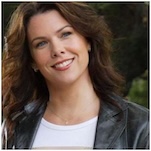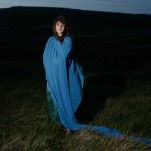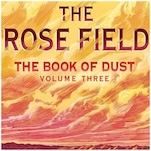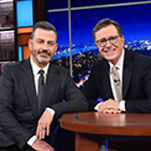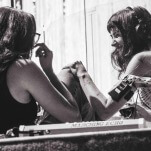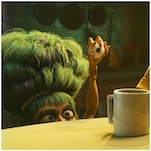Katherine Ryan Doesn’t Bite Her Tongue
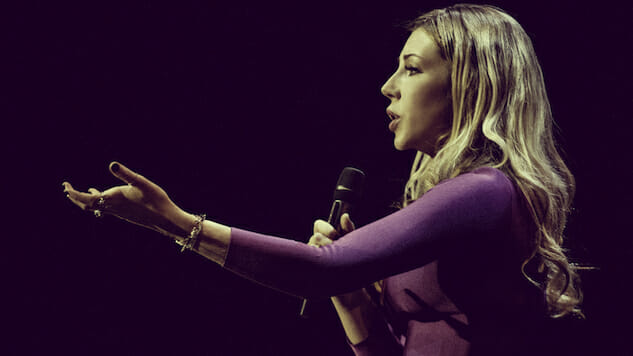
It takes only one hand to count the number of times a UK comic’s Netflix special has been released globally. Two fingers, to be exact. Jimmy Carr’s Funny Business marked the first, and now Katherine Ryan’s In Trouble, streaming on Netflix today, has become the second. Those unfamiliar with Ryan’s work will notice something different as soon as she opens her mouth: She lacks a British accent. Originally from Canada, Ryan got her start doing open mics in Toronto while attending university. “I wasn’t properly performing in Canada,” she says. “I was just starting out, and when everyone starts out they’re terrible. I’m sure there are some Kellyanne Conway videos of me just really dying on a stage.”
Comedy wouldn’t be what originally brought Ryan to the UK—a desk job provided that opportunity—but it would help her stay. And in the seven plus years since she dedicated herself to comedy full time, she has become a household name beyond her adopted nation. Ryan has performed at Montreal’s Just for Laughs Festival, the Melbourne International Comedy Festival and the Edinburgh Festival, among others, and has a serious number of credits to her name. Not only has she appeared on numerous panel shows like Bring the Noise and 8 Out of 10 Cats Does Countdown, but she will soon co-host the revived series Your Face or Mine? with Jimmy Carr, and host her own series, an update and adaption of Joan Rivers’ 2009 show by the same name, How’d You Get So Rich?
“I was lucky to develop in the UK because I find comedy—in addition to being caustic—it’s quite literary over here, and alternative comedy isn’t so alternative,” she says. “It’s really mainstream to have loads of mixed styles, like musical comedians, stand-ups and sketch.” Thanks to that diversity, Ryan avoids being categorized into one particular stand-up narrative. “It used to have to do with the Kardashians and Real Housewives and maybe Paris Hilton back in the day, and the little things in my periphery,” she says of her former subject matter, “but now that has widened. Now I’m a taxpayer and a parent. I just talk about whatever I want, I guess.”
Ryan’s style, if a descriptor must be chosen, is biting. She balances romantic troubles with family drama, raising a young daughter with white privilege, and “taking the piss out of” Taylor Swift’s weak-kneed feminism with the complexity of Bill Cosby’s many sexual assault cases. She jumps from topic to topic, wittily crafting a pathway that doesn’t feel meandering, but sharply wends toward a point. Ryan may take her digs, but she aims to punch up rather than down. “I feel like I’m always on the right side of wrong, and trying to shout out for the underdog,” she says.
In one particular set-up, she goes after Swift for the Twitter war that erupted between her and Nicki Minaj in 2015. The bit is layered: It’s Ryan performing Minaj performing a plantation-era “Mammy” voice to underscore Swift being out of line. The bit understandably draws some uncomfortable noises from the audience during her special, but Ryan clearly sides with Minaj. “I think if you are on the wrong side then absolutely the UK has no tolerance for racism, but the hero in that story is Nicki Minaj,” she says. “I’m taking the piss out of the way I think she was treated unfairly. There will always be people who hear a word and react. They’ll hear the word ‘black’ and they’ll go, ‘Uh-oh, what I’m about to hear is racist,’ when really it’s activism, so I don’t mind confusing those people because I can’t avoid it.”
But Ryan has a dedicated fan base that understands her purpose as well as her tone. “People who like my stuff and know what my agenda is have never mistaken me for being racist or poking fun at the wrong thing,” she adds
If some of Ryan’s comedy comes off as uncomfortable, it’s because she appreciates that very quality. Being uncomfortable can be revealing. “I think sometimes it’s necessary to feel uncomfortable to confront things about yourself, and to say, ‘Oh, why am I laughing at that? Do I understand that properly? Maybe my culture is a little bit unfair that way,” she explains. “I love comedians like Chris Rock and Dave Chappelle and Louis C.K. They make you think about things and they make you uncomfortable for the right reasons.”
She’s been compared to Joan Rivers, who represented a caustic presence onstage at times simply because she was a woman speaking her mind, and at others because what she said went against traditional notions of femininity. “I didn’t get to meet Joan Rivers, and she was known as a shock comedian or a nasty comedian, but people say unanimously offstage she was the kindest person and always very charitable and looking out for other people,” Ryan says. “And I feel like your persona onstage by and large shouldn’t be taken at face value.”
But that’s not to say her jokes haven’t landed her in hot water. During an appearance on the BBC comedy show Mock the Week, a comment Ryan made in response to the prompt “Unlikely Lines from a Cosmetics Company” drew ire from across the globe when she, pretending to be a cosmetics representative, said they didn’t test on animals but chose Filipino children instead. “We all know about trolls and their specific preference for women, but they not only included me but my daughter as well,” she says of the fallout. “That did make me go, ‘Huh, this can be quite a dangerous job.’ But in the end we were fine. I don’t think anybody who’s actually going to kill you tells you they’re going to kill you.”
Ryan’s subject matter and tone has earned her the label “nasty” at times, but thankfully the descriptor has a whole new meaning in the Trump era. “I wasn’t really a rebel, but when people tell you that you can’t do something it makes you want to do it more,” she says. “As I get older, I’m more informed about history and some of the ‘nasty women’ who gave me the very privileged life that I have now through their sacrifice. I think they are my favorite women and they executed the most change and I’m grateful for them. I think it’s not only fun but necessary take whatever they call you and reclaim it as your own and throw it back in their face in a positive way.”
Ryan’s bravado especially comes across in the crowd work she does throughout Funny Business. Where heckling seems to be the bane of many a comedian’s existence, Ryan finds a comfortable exchange with her audience that further highlights her own sharp tongue. It helps that her confidence and quick-wittedness keep the audience on her side.
As for the debut of Funny Business, Ryan isn’t entirely sure what to expect. “We have a relatively small and supportive community here and I’ve never done anything on this scale,” she says. “That’s the first thing that shook me a bit. I was nice and safe tucked up in the UK where everybody’s nice to me. So we’ll see. Ask me again in six months.”
Amanda Wicks is a freelance journalist specializing in comedy and music. Follow her on Twitter @aawicks.














